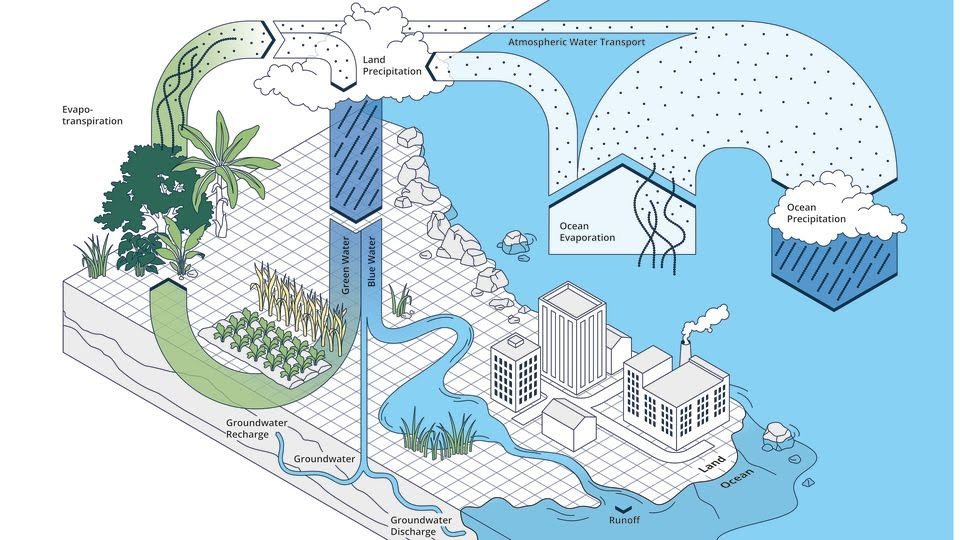For the first time in human history, humanity has thrown the natural cycle water off balance
We have created a worldwide water disaster
For the first time in human history, the natural system that moves water around the Earth is out of balance due to human actions, leading to a worsening water crisis that is affecting economies, food supplies, and human lives, according to a major new report.
This disruption has been caused by decades of poor land use and water management, combined with climate change brought about by human activity. The report, published by the Global Commission on the Economics of Water, states that these factors have put unprecedented pressure on the water cycle—the process by which water circulates throughout the Earth.
The water cycle is a complex system where water evaporates from the surface, including from lakes, rivers, and plants, into the atmosphere. This evaporated water forms rivers of water vapor that can travel over long distances before cooling and falling back to the ground as rain or snow. This constant movement of water is essential for life on Earth, as it replenishes freshwater supplies.
However, this natural cycle is now being seriously disrupted. Nearly 3 billion people already face water shortages, and the situation is leading to widespread suffering. Crops are drying out, and cities are starting to sink as the groundwater beneath them is being depleted. Without immediate action, the report warns that the consequences will be even more severe. The water crisis threatens more than half of the world’s food production and could reduce global economic output by an average of 8% by 2050. Poorer countries could experience losses as high as 15%.
Johan Rockström, co-chair of the Global Commission on the Economics of Water and one of the report’s authors, said that humanity is pushing the global water cycle out of balance for the first time in recorded history. He pointed out that precipitation—the source of all freshwater—can no longer be relied upon as it once was.
The report explains that there are two types of water involved in the water cycle: “blue water” and “green water.” Blue water refers to the liquid water found in lakes, rivers, and underground aquifers. Green water, on the other hand, is the moisture stored in soils and plants, which is just as important as blue water. Green water is released back into the atmosphere when plants release water vapor, and this process generates around half of the rainfall that occurs over land.
The breakdown of the water cycle is closely linked to climate change. Green water is essential for supporting plant life, which in turn helps to store carbon, the gas that causes the planet to heat up. But when humans destroy wetlands and forests, these natural carbon sinks are depleted, which speeds up global warming. At the same time, rising temperatures are drying out landscapes, reducing the amount of moisture in the air and increasing the risk of wildfires.
The water crisis is further worsened by the growing demand for water. According to the report, people need around 4,000 liters (about 1,000 gallons) of water each day to live a dignified life. This is far more than the 50 to 100 liters the United Nations says is necessary for basic needs. Many regions of the world won’t be able to meet this demand from local water sources.
Richard Allan, a professor of climate science at the University of Reading in England, said that the report paints a bleak picture of how human activity has disrupted the global water cycle, which is the most vital natural resource for sustaining life. Human actions are changing the land and atmosphere, warming the climate, and making both wet and dry conditions more extreme, Allan added. This is also altering weather patterns, affecting where and how much rain and wind occur.
The only way to address this crisis is through better management of natural resources and a drastic reduction in the pollution that is heating up the planet. Governments need to act together to treat the water cycle as a shared resource. Water doesn’t stay within borders—rivers and lakes span multiple countries, and water in the atmosphere can travel long distances. Decisions made in one country can affect rainfall in another.
The report also stresses the importance of changing how we value water in the economy. Water is often wasted or used inefficiently, especially when thirsty crops are grown in areas already suffering from water shortages. Additionally, industries like data centers, which require a lot of water, are sometimes built in regions that don’t have enough of it.
Ngozi Okonjo-Iweala, director-general of the World Trade Organization and co-chair of the commission that published the report, said the global water crisis is a tragedy, but it also presents an opportunity to rethink how we manage water. By putting a proper value on water, we can start to address its scarcity and recognize the many benefits it provides.
For more information read the articles at
https://www.cnn.com/2024/10/16/climate/global-water-cycle-off-balance-food-production/index.html#amp_tf=From%20%251%24s&aoh=17291801257653&csi=0&referrer=https%3A%2F%2Fwww.google.com&share=https%3A%2F%2Fwww.cnn.com%2F2024%2F10%2F16%2Fclimate%2Fglobal-water-cycle-off-balance-food-production%2Findex.html
and
https://www.unicef.org/wash/water-scarcity


